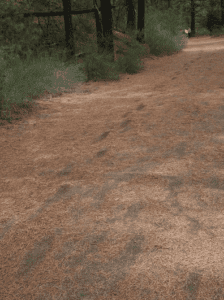Paul Rousseau
Charleston, South Carolina, United States
 |
| Footsteps in the forest. Photo by Nicholas D. on Flickr. CC BY-NC 2.0. |
Chart
This is a 32-year-old female with widely metastatic breast cancer admitted to the hospital for control of shortness of breath and pain.
____
Melissa sits slumped, mouth open, snoring. I pull a chair bedside and gently touch her shoulder. Her head jerks, startled. She wipes drool from her chin and adjusts her oxygen mask.
“Doctor, I have to tell you about my dream.” She is excited, her eyes darting, her arms flapping. She describes walking a worn path with footsteps etched in the soil. A sturdy wind arose, with gusts that grew stronger and stronger. Then, suddenly, the air was still and the footsteps vanished. A small piece of paper floated from the sky and landed in her hands. Two words were scribbled in blue ink: Not yet. She gasps a short puff of air, yanks her oxygen mask, and spits a dollop of bloody phlegm into a tissue. “I believe the wind and footsteps were from angels leading me down the path, and the gusts of wind were when they flew away. They dropped the note to let me know it was not my time to die.” She bends forward and draws a deep breath. “So, can you please ask my oncologist to figure out a new chemo regimen?”
I offer a feeble smile and tell her I will speak with the oncologist, but caution her that he may not recommend further chemotherapy. She motions toward her two young children playing with Legos. “I’ll change his mind.” I glance at her husband. He stands in the corner tapping his right foot and wringing his hands repeatedly. “Thank you for agreeing to speak to the oncologist. It means a lot to Melissa and me.”
I excuse myself and retire to the nurses’ station. The nursing supervisor approaches and asks if Melissa discussed her dream. I nod. “She can’t tolerate more chemo,” she says. “It’ll kill her. Besides, God doesn’t need chemo if He wants her to live. But of course, I didn’t tell her that. Her basic problem is denial, and the distance between death and denial is paper thin.” I acknowledge her concern, but suggest it is more hope than denial and remind her that patients on the far end of the bell curve have survived despite their dismal prognoses. I also suggest that many of us do not know what we will do when we are dying, particularly when young and with children. What we think we would do, we may not do. We might choose to continue aggressive treatment until our final breath, or, worn by the advance of disease, we might lose our resolve to live.
PAUL ROUSSEAU (he/his/him) is a semi-retired physician, writer, lover of dogs, and occasional photographer published in sundry literary and medical journals. Co-winner of flash fiction competition Serious Flash Fiction 2022. Nominated for The Best Small Fictions anthology from Sonder Press (2020). Twitter: @ScribbledCoffee
Spring 2022 | Sections | End of Life

Leave a Reply